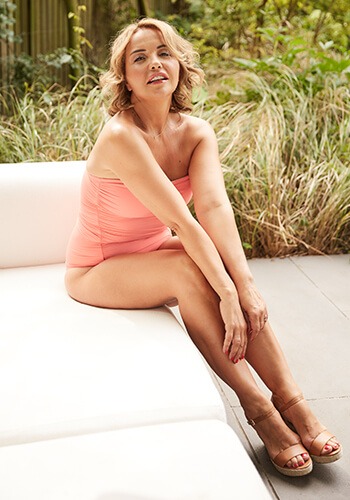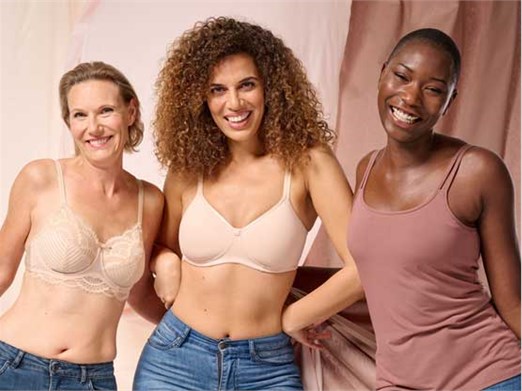Vera Ora Talks About Breast Cancer and Mental Health
How her diagnosis taught Vera Ora to focus on her emotional wellbeing
Vera Ora is a London doctor who specializes in psychiatric health. A successful career woman, Vera is also in the public eye (she has nearly 50,000 followers on Instagram), famous in her own right and as the mother of UK superstar singer Rita Ora. She was diagnosed with breast cancer in 2005, aged just 39.
In the mid-1990s Vera moved to the UK from Kosovo with her husband and young family — a significant turning point as she adjusted to a new way of life in a foreign country. With three small children to raise while trying to learn English so that she could qualify to practice medicine in the UK, she believes now that the stress she was under at the time contributed to her diagnosis. “I had no lump and I didn’t feel ill,” she says, “but I did feel some kind of intuition about it. I went to my GP and asked for a mammogram, following which my fear turned to reality.”
Vera remembers the day she was told she had breast cancer: “My emotions are raw about it even now.” Although her immediate family were very supportive, she had left a lot of friends and family behind in Kosovo so she felt there weren’t many people she could turn to. She tried to keep her feelings to herself in order to protect her husband and children, but now believes that wasn’t the best way to deal with it: “I think it’s important to have people to talk to you when you get your diagnosis. That is when you need the support.”
Vera’s was an aggressive form of breast cancer, and she was told she’d need a mastectomy, followed by radiation and chemotherapy. She did not find that being a doctor helped her cope with her illness any better: “I am grateful for the knowledge I had about breast cancer but this didn’t change how it felt for me,” she says. Rather than attend a support group, Vera chose to have one-to-one psychological therapy: “Your emotional state is the key to your recovery,” she says. “I wasn’t ready to face other people and talk about my feelings and emotions, but the one-to-one therapy helped quite a bit. I think it is crucial to know your needs and seek the help that’s right for you.”
How Vera coped after her mastectomy
Feeling isolated and missing her family, Vera couldn’t wait to be discharged from the hospital, but looking in the mirror was a step she didn’t feel ready to take for several weeks. “The treatment does come to an end at some point but the scarring doesn’t go away — it’s always there. I felt my femininity had gone and didn’t feel like a woman. I had been pretty proud of my breasts before surgery, but it took me a while to start to feel comfortable and confident, and to be intimate with my partner again.” Opting to have breast reconstruction was part of that process. “I’m really pleased with the results. I feel good in myself now, and I think that is so important for your self-esteem.”
Like so many women, Vera was not prepared for the side effects of chemotherapy. “The tiredness and the sickness are really crippling, but the most devastating thing for any woman is losing her hair. It’s what you wear every day. Thank God mine grew back after a few weeks, but it certainly did affect me.” As a psychiatrist, she knew how important her mental health was in terms of her recovery, and she believes that studying to gain her medical qualifications in the UK gave her the focus she needed. “I had my exams set up. Now I was committed to passing them, and I was lucky that this took my mind off my illness and gave me something to look forward to.”

Feeling positive after breast cancer surgery
Since her diagnosis, Vera feels her ‘new normal’ is very different. “Having breast cancer surgery and going through the treatment affected me as a woman, a mother and a wife, but I was determined to make positive changes. I’ve started to focus more on myself, to do the things I want to do. Passing my exams and getting a job with the NHS made me feel proud of myself. I think breast cancer has made me a better doctor, too. I can relate to my patients, understand and empathize with other people much better now.”
As well as eating well and taking time to exercise, relax, and enjoy family moments, Vera’s key body-confidence boosting tip is to “be happy. And remember you can reach out and get the support you need to do it. But for women who are newly diagnosed, I’d say don’t rush into treatment decisions. Get all the information and support you need — there’s plenty out there, you just have to be aware and be proactive with it. And try to have an aim in life to feel positive about.”
Vera Ora was an Amoena Ambassador and model for the Melissa Odabash Swimwear Collection for Amoena and Future Dreams in 2019.





















